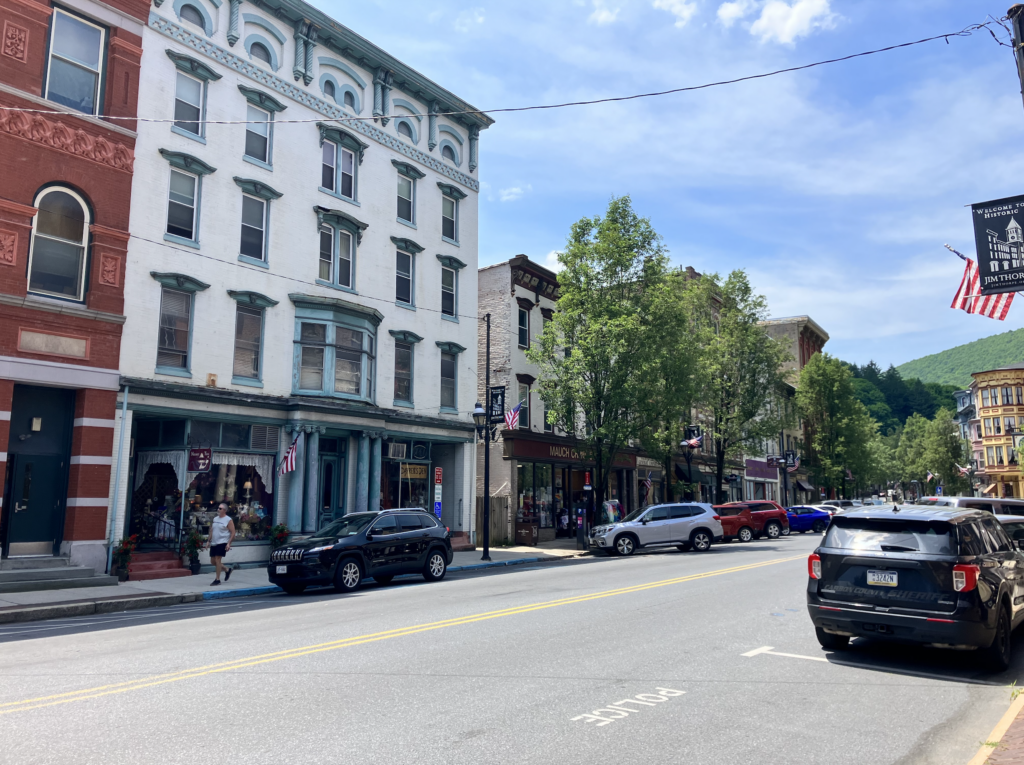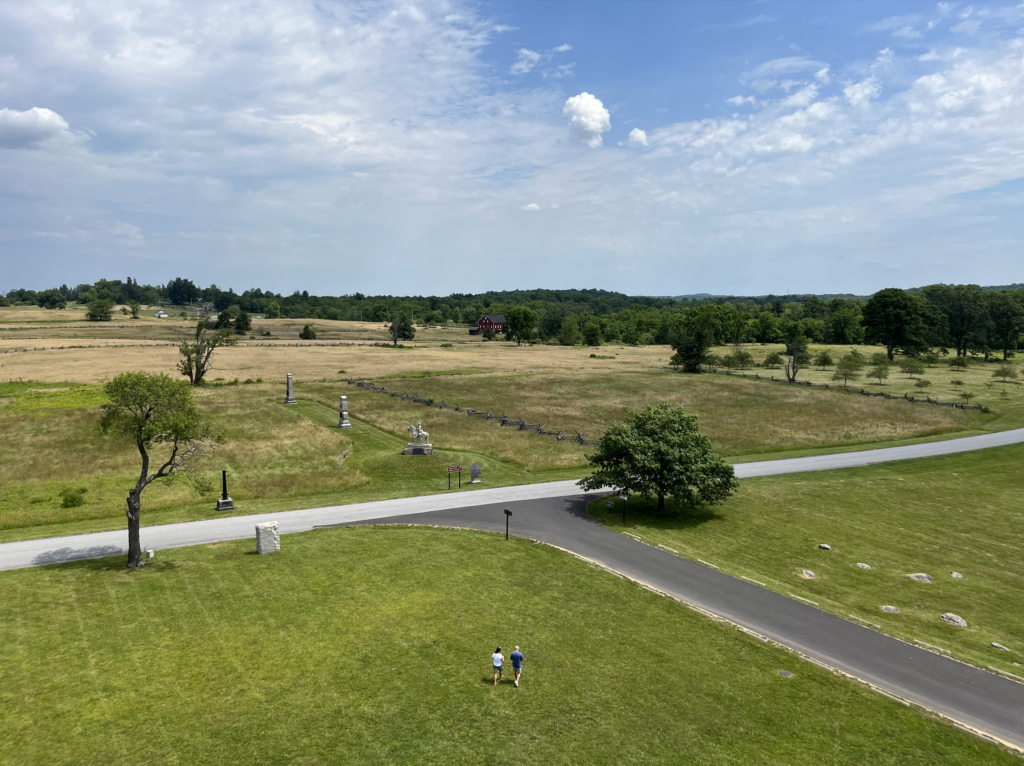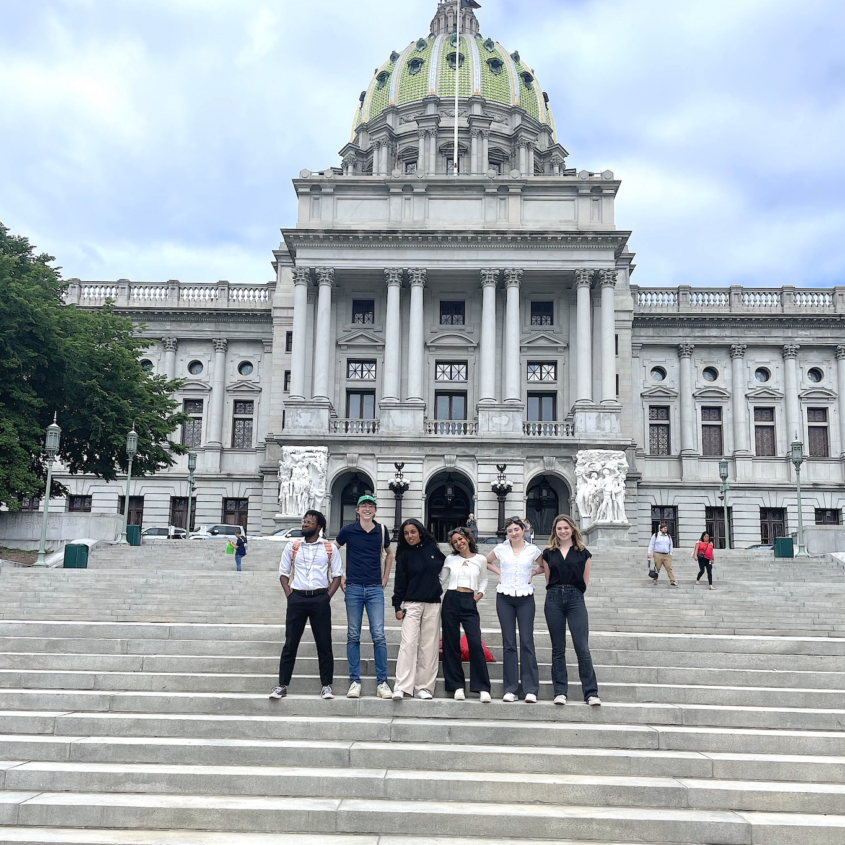Political Empathy Lab (PEL)
Listening with Heart and Mind
The Penn Commonwealth-Engaged Scholars Program
In November 2023, the University of Pennsylvania unveiled its new strategic framework, In Principle and Practice. This framework is built around Penn’s long-held values, our unique DNA, and our distinctive strengths. It calls us to be an anchored, interwoven, and engaged institution that applies Penn’s remarkable capacity for inventive solutions and service-minded leadership to pressing problems.
With the generous support of a University of Pennsylvania Draw Down the Lightning grant through the Office of the President, faculty and professional staff now have an opportunity to learn about, explore and engage with communities across the Commonwealth of Pennsylvania in new and meaningful ways over the course of an academic year.
If you are faculty and professional staff interested in learning more, watch a recording of the informational webinar here and view the presentation slides here.
About the Penn Commonwealth-Engaged Scholars Program
The Penn Commonwealth-Engaged Scholars Program (PCES) is a multi-faceted education and engagement initiative to connect the university community with Pennsylvania’s people and communities. During the 2025-2026 academic year, five to ten Penn faculty and professional staff—chosen through a competitive application process—will participate in a community of learning and practice. Scholars will meet throughout the academic year to learn about Pennsylvania and travel the state to experience its distinct regions. At the end of the program, scholars will have an opportunity to develop and execute projects that apply Penn’s leadership, knowledge, vision and creativity to benefit Pennsylvania.
PCES consists of three dynamic learning and engagement opportunities:
Education:Selected scholars will meet six times throughout the 2025-2026 academic year (approximately 12 hours in total). These meetings willintroduce participants to Pennsylvania’s history, its political governance structure and institutions, as well as regional socio-cultural and economic differences. These briefings also will explore Penn’s position within the Commonwealth, such as existing relationships and representation by students, employees and alumni throughout the state.
Travel: Two trips to Pennsylvania destinations will be integrated into the educational component—one during Penn’s Fall Break (October 9-12) and one during Spring Break (March 7-9). The intentionally designed travel itinerary will introduce participating scholars to the state, illustrating Pennsylvania’s geographic, democratic, economic, industrial, cultural and political distinctions. These tours will feature conversations with local leaders to shape perspectives about pressing regional issues affecting residents, the economy, and quality of life.
Commonwealth Engagement Grants: To foster new, longer-term engagement opportunities between Penn and Pennsylvania’s communities and to incentivize the interdisciplinary practice and leadership called for In Principle and Practice, PCES will award to scholar-participants, on a competitive basis, Commonwealth Engagement Grants that facilitate purposeful and longer-term engagement with communities they visit. Applicants will be expected to draw connections from their PCES experience to Penn’s capacity for good through community-informed and engaged practice, service and research.

Image of downtown Jim Thorpe taken during PEL summer 2024. Photo by Noah Kocher.
PEL Phase II
Phase II of PEL (May 26-30, 2025) launches this spring as a larger group of students take a one-week trip to visit some important parts of Pennsylvania to continue building upon our strategies of connection and developing our skills of political empathy.
To learn more, read the PEL Phase II Press Release and meet the new team!
PEL News
Read recent media coverage of Political Empathy Lab Phase II.
Political Empathy Lab Tour Returns to Johnstown – The Tribune Democrat
Read essays and media coverage of Political Empathy Lab Summer 2024.
UPenn Political Empathy Lab Students Study Bridging Ideological Divide – Public News Service
Talking Across the Political Divide – WHYY’s The Connection with Marty Moss-Coane
Learning to Listen: Lessons from the Political Empathy Lab – Fair Districts PA
Political Empathy Lab Participants’ Work Continues After Election – The Tribune Democrat
Un Jour dans le Monde (One Day in the World): US Election Special Broadcast – Radio France
Event Highlights Student Voting Resources and Penn’s Political Empathy Lab – Bryn Mawr College Newsletter
Episode 6: A Campus Conversation with Dr. Lia Howard – A Wellness at Penn Podcast
Across Pennsylvania, Penn students practice ‘political empathy’ to connect divides – Penn Today
Lessons in Voting – The Philadelphia Citizen
How to Embrace Your Political Enemy – Daily Good
How to Embrace Your Political Enemy – The Philadelphia Citizen
Dr. Lia Howard and Lynn Larabi Interview on Political Empathy Lab – WHYY Morning Edition with Host Jennifer Lynn
Penn’s Political Empathy Lab Research Team Visits Johnstown – The Tribune-Democrat
5 College Campuses Bridging Differences – Greater Good Science Center
Empathy is on the rise in young people. Here’s how to build yours. – CNN
Democratic Listening, Proximity and a Purple Flower – SNF Paideia Blog
Inattentive Blindness and State Politics Revealed – SNF Paideia Blog
About the Political Empathy Lab Project
Researchers at Penn and beyond are studying affective polarization. PEL continues this work and applies it by equipping Penn students to connect with others by attuning themselves to their own thoughts and feelings as they listen to different points of view. It strives to develop and cultivate practices for both the outer conversation and the inner conversation. These practices and the regular exercise of them, especially the practice of listening, builds social trust and is a necessary precondition for deliberative democracy. Some of the practices are explored, refined, and exercised in the spring course PSCI 4201 Political Empathy and Deliberative Democracy.

Additional practices were discovered with undergraduates democratically, collaboratively, ethnographically, and inductively through a trip during the Summer of 2024 to visit counties across the Commonwealth of Pennsylvania beyond the Philadelphia region. The research experience consisted of several mini trips to encounter Pennsylvanians across the state who hold different socio-political views. This research experience was deliberately not canvasing and not polling (though we worked with Penn’s Public Opinion and Election Studies (PORES) team to inform our practices). It was not intended to extract policy positions from Pennsylvanians but instead to engage with them using specific practices to cultivate emotional regulation while listening to diverse political opinions.1
PEL’s research trip was also not tourism but an opportunity to meet fellow residents of Pennsylvania within the state acknowledging that we experience different lived realities and want to try to better understand each other. The hope was that this experience would sharpen and awaken our intellectual humility and curiosity around ideologies and beliefs that differ from our own. An additional aspiration was that we might understand how place may connect to ideology as well as the role that super-ordinate identities may hold to our sense of belonging. Finally, this trip provided diverse immersive opportunities to regularly exercise our practices around dialogue and engagement.
Why did PEL choose PA?
- 2024 was an Election year and Pennsylvania is a swing state
- This would allow Penn students to encounter “the other side” of issues where there may appear to be consensus at Penn
- This would likewise allow folks in other communities in Pennsylvania to encounter Penn students with the aspiration of dispelling myths about so called “elites”
- Pennsylvania has regional variation and both rural, suburban and urban counties providing an in-depth social and political analysis of one state
- Pennsylvania is the state in which Penn is located. As an institution we often discuss our local identity as Philadelphians but less frequently our identity as Pennsylvanians
- Some of these practices were explored, refined, and exercised in the SNF Paideia spring course, PSCI 4201 Political Empathy and Deliberative Democracy.
Political Empathy Lab Podcast
Continue to follow the project with a special edition of The Park podcast. Travel with us through audio across Pennsylvania and into the experiences of others by listening here or below.
Have questions about the project and want to learn more? Please email us at: politicalempathylab@snfpaideia.upenn.edu.
Read more about PEL and the research team in the project press release here.
Political Empathy Lab gratefully acknowledges our funding from the Office of the Provost and the Trustees’ Council of Penn Women.
1This project acknowledges and seeks to explore whether there are limits to our political empathy—namely if there are identities, we may hold that feel particularly vulnerable during certain moments and in certain contexts. For example, those who hold minority identities might not want to take on the emotional labor of listening to views that might deny their humanity. This is an idea that we will wrestle with in Political Empathy Lab. Though we are building muscles of engagement, self-awareness of one’s own positionality vis a vis others in conversation might lead participants to discern when to lean on other members of the research team. This type of community building within the team requiring both allyship and self-knowledge is also an important component of the trip.

